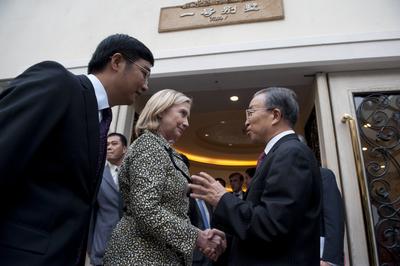US policies in the Middle East are deeply flawed. The operations in Afghanistan and Iraq have cost far more in blood and dollars than is commensurate with the good they have yielded for the people of either country, or the wider world.
The increase in support for American withdrawal after the death of Osama Bin Laden has highlighted just how shallow US popular support for these conflicts is. The symbolism of Bin Laden’s death has nudged the debate towards withdrawal; a decade of thankless violence was not, on its own, enough.
The US must adopt a more pragmatic foreign and security policy, one that is more mindful of costs, more focused on clearly-articulated outcomes, and less eager to resort to the use of armed force. It must do this for one simple reason — the next 20 years will be much tougher than the last.
Asia will increasingly be the central issue in American foreign and strategic policy — though it has been the centre of its strategic reality for a while now. Mistakes in Asia will not be as easy to overcome as those of the last two decades.
America’s rivals in the Middle East (as well as its friends) have been hampered by domestic instability and limited economic resources in what are essentially semi-industrialised economies. But Asia is different. The largest economy in the Middle East is the region’s dominant state, Iran. There are seven countries in Asia with economies bigger than Iran’s: China, Japan, India, South Korea, Indonesia, Australia and Taiwan. And America does not have the strategic preponderance in Asia that it has enjoyed, and misused, in the Middle East.
So what would a more pragmatic strategic policy for the US look like? There are two points here, which go arm in arm. The first is America must be much more reticent to use force to achieve aims expressed in terms of values. The second is it must make more space for China.
This is where former US President Nixon comes in. In 1972 he became the first American President to go to China. This visit was remarkable — it normalised relations with the People’s Republic of China, a communist state in the middle of the Cold War. It was a very dove-ish move, particularly from a Republican. But Nixon recognised that the US needed China as a friend in Asia, to mitigate the threat from Soviet Russia. Now, the United States needs to maintain good relations with China because it is the dominant state in the region, and growing fast.
If President Obama’s foreign policy record shows anything it is that Democrats — whatever their private beliefs — often cannot afford to be doves. Democrats are extremely vulnerable to claims of weakness on foreign policy from the conservative side of US politics. Obama has been no exception, finding it difficult to end his inherited wars. This was not the case for Nixon: he started pulling out of Vietnam, although he was only to be interrupted by Watergate. As China grows, it will continue to frighten American policy makers. A Democrat who is too soft on China will be a very easy target. But America and her allies need a dove in the White House, who can accommodate the world’s fastest growing power. That means America probably needs a Republican.
June’s Republican presidential debate in New Hampshire suggested that if we get a Republican we might be in luck. The seven candidates offered a more-or-less coherent opposition to Obama’s continuation of Bush’s wars, and of US intervention in Libya. Mitt Romney, the former Governor of Massachusetts, offered a foreign policy perspective promisingly different from the muscular liberalism of recent decades: ‘Our troops shouldn’t go off and try to fight a war of independence for another nation’.
China is a different issue. Saying no to Afghanistan is easy at the moment — particularly for a Republican presidential hopeful. Accommodating a growing China once in office would be a different matter altogether. It will mean costs for American pride, and acknowledgement of some of the limits of US power, particularly in Asia. Just as China had difficultly admitting equality with Britain in the 19th century, the United States will have difficulty admitting equality with China in the 21st. But it will be easier for a Republican to do it than a Democrat. Let’s hope one of the seven candidates from the debate is the next Richard Nixon.
Harry White is the editor of Pnyx blog.
A version of this piece was originally published here on Pnyx blog.


What major actions are left to be taken? Interest rates are already near zero, they are pumping as many dollars into circulation as possible, and they cannot cut spending enough to balance the budget, no matter what they cut. There is no way that gold can drop until the dollar dies and a new currency springs up. It should be a currency that the people own, not the central banks! Ron Paul 2012!!!!
http://youtu.be/s8VxtRV_vac